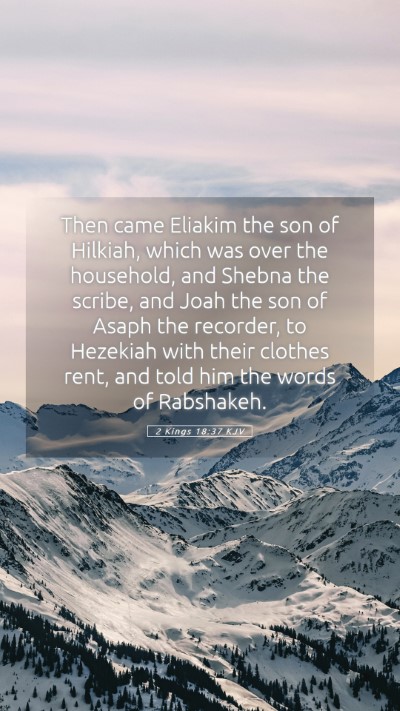Bible Verse Commentary on 2 Kings 18:37
Verse: 2 Kings 18:37 (KJV) - "Then came Eliakim, the son of Hilkiah, which was over the household, and Shebna the scribe, and Joah, the son of Asaph, the recorder, to Hezekiah with their clothes rent, and told him the words of Rabshakeh."
Understanding the Context
This verse occurs in the historical context of Israel's conflict with Assyria, specifically during the reign of King Hezekiah. Assyria, under King Sennacherib, threatened Jerusalem, and Rabshakeh, the Assyrian envoy, delivered a message of intimidation to the people of Judah.
Bible Verse Meanings
This verse encapsulates a moment of distress and urgency in Jerusalem's history. The act of tearing their clothes by Eliakim, Shebna, and Joah signifies profound grief and concern for the fate of their people. The message they bring to Hezekiah is laden with fear and the need for a response to the Assyrian threat.
Bible Verse Interpretations
- Emotional Response: The tearing of clothes symbolizes deep sorrow and a national crisis, representing the gravity of the situation.
- Leadership and Authority: Eliakim's role over the household denotes his position as a key leader, emphasizing the structure of governance in Judah.
Bible Study Insights
This verse provides important insights for those engaging in Bible study. It leads to discussions about the nature of fear in the face of oppression and the responsibilities of leaders during critical times. The dynamics of communication between leaders in times of crisis reveal much about faith and reliance on God.
Significance of the Leaders' Actions
The actions of Eliakim, Shebna, and Joah serve as a model for how leaders should approach crises. Their decision to inform King Hezekiah demonstrates the importance of open communication and collaboration among leaders in times of turmoil, which is a relevant takeaway for modern-day applications of leadership.
Scriptural Analysis and Exegesis
- Historical Context: Understanding the Assyrian empire's expansion and the geopolitical landscape of the time enhances the interpretation of this passage.
- Thematic Elements: Themes of faith, desperation, and the collective responsibility of the community come into play in this narrative.
Application of 2 Kings 18:37 in Daily Life
For contemporary readers, this verse encourages reflection on how we respond to crises. It underscores the importance of community support, being truthful about our fears, and seeking guidance from capable leaders.
Cross References
- Isaiah 36:22: This verse parallels the narrative of Rabshakeh’s speech and highlights the overall tension between Assyria and Jerusalem.
- 2 Chronicles 32:21: Discusses God’s intervention in response to Hezekiah's prayers during the Assyrian siege.
- Psalm 46:1: Offers a reassurance of God as a refuge and strength, applicable during instances of fear and distress.
Final Thoughts
2 Kings 18:37 teaches us about the fragility of human strength in the face of overwhelming odds and the importance of turning to God in prayer during such times. The leaders' actions serve as a reminder of the need for unity and effective communication during crises, a lesson vital for both individuals and communities alike.


